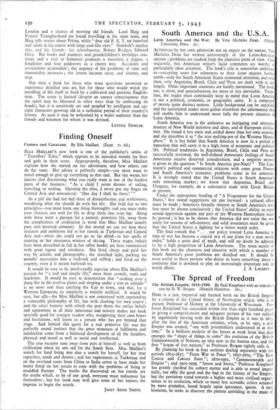South America and the U.S.A.
Latin America and the War. By Vera Micheles Dean. (Oxford University Press. 25.) ALTHOUGH by her own admission not an expert on the matter, Vera Micheles Dean has written interestingly of the Latin-American nations ; problems are studied from the objective point of view. Con- sequently, this American writer's lucid comments are worthy Ci! particularly close attention. The book's title is somewhat ambitious as—excepting some few references to their sister nations further north—only the South American States command attention, and even then, only Argentina, Brazil, Chile and'Peru are dealt with at any length. Other important countries are hardly mentioned. The book, too, is short, and generalisations are more or less inevitable. There- fore, the reader must continually keep in mind that Latin America is not a political, economic, or geographic unity. It is composed of twenty quite distinct nations. Little background can be supplied, and the uninitiated reader must gather elsewhere the information that will enable him to understand more fully- the present situation in Latin America.
South America was to the authoress an intriguing and attractive mixture of New World initiative and ideas, and of European civilisa- tion. She found it less static and settled down than her own country, and she describes it as " the true melting-pot of the Western Hemis- phere." It is her belief that South America is now in a period of transition that will carry it to a high form of economic and political life. Political tendencies in Argentina, Brazil, Chile and Peru are successfully reviewed, the well-defined democratic feelings of South Americans receive deserved consideration, and a negative answer is given to the question " Is South America pro-Nazi? " The Con- tinent's political and commercial relations with some great Powers and South America's economic problems come in for attention. It is wrongly stated that the United. States is South America's only remaining market ; we know that Argentina, Brazil and Uruguay, for example, do a substantial trade with Great Britain at present.
Under the appropriate heading of " A Programme for the United States," five sound suggestions are put forward: a cultural effort must be made ; America's friendly interest in South America's wel- fare must be shown conclusively ; the United States' ability to repel armed aggression against any part of the Western Hemisphere must be proved ; it has to be shown that America did not enter the war solely for reasons of self-interest, and solid assurances must be given that the United States is fighting for a better world order.
The final remark that " . . our policy toward Latin America in time of war has become a crucial test of our plans for a new world order," holds a great deal of truth, and will no doubt be adhered to by a high proportion of Latin Americans. The main merits of this book are the clearness and sincerity with which a number of South America's great problems are sketched out. It should be most useful to those persons who desire to learn something about a continent that is destined to play an increasingly important role in


























 Previous page
Previous page